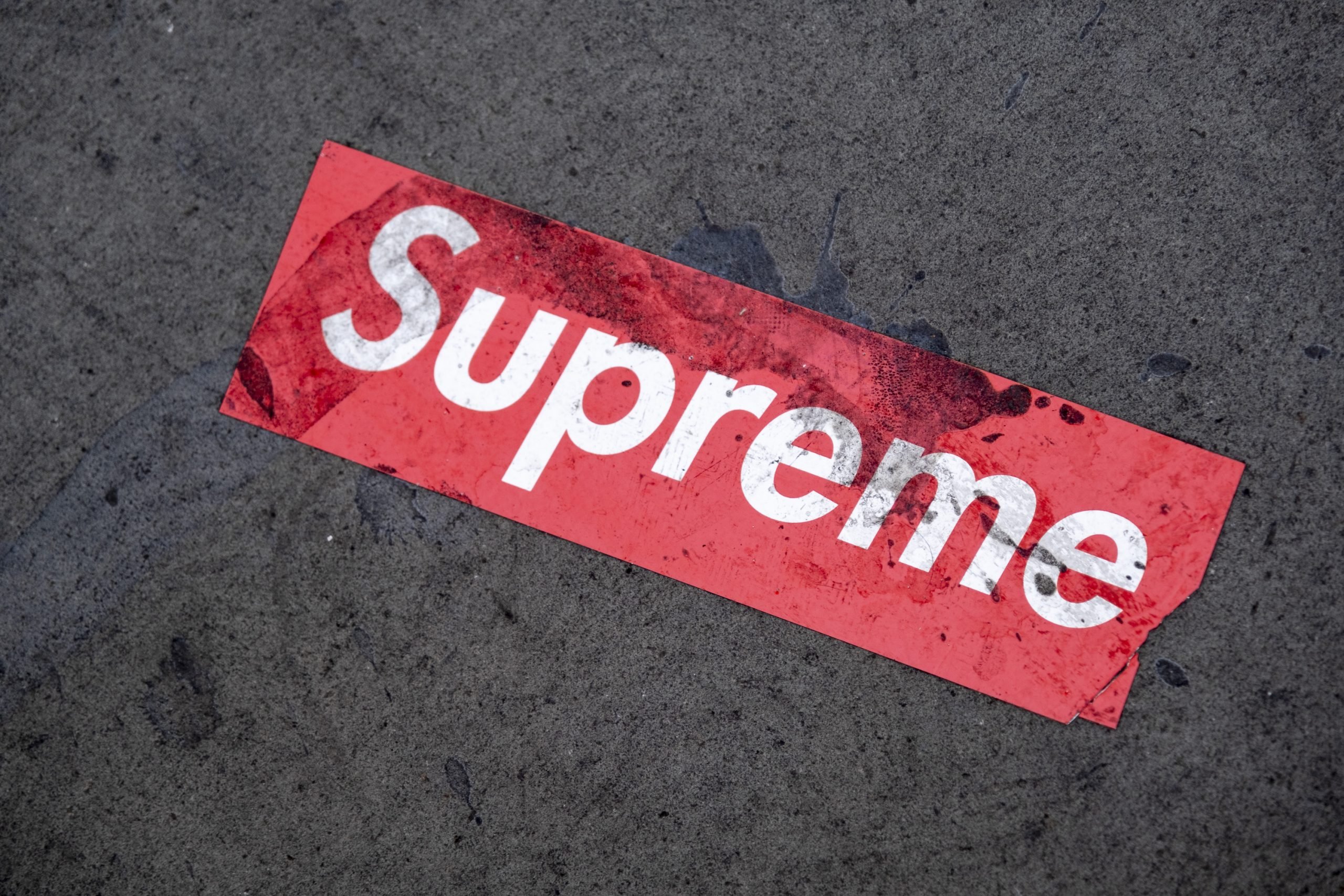
It was the worst-kept secret in the world of streetwear: Supreme owed its logo to the American artist-provocateur Barbara Kruger, best known for her text-and-image artworks, which could be thought of as precursors to memes.
In the early 2010s, Supreme was the most hyped brand in fashion, mainstreaming a culture of drops and collabs through products that were simultaneously exclusive and populist, quotidian and collectible. Its logo—that vibrant red box with letters in the Futura Bold Oblique font—was suddenly ubiquitous, slapped onto T-shirts, skateboards, dog bowls, nunchucks, harmonicas and seemingly most anything else.
The story of how Supreme’s logo came to closely resemble Kruger’s graphic style goes something like this: back in 1994, James Jebbia, Supreme’s founder, commemorated the opening of his downtown Manhattan skate shop by releasing three T-shirts. One featured an anonymous 1970s skater, another bore the grizzly face of Robert De Niro in Taxi Driver, and a third was white with nothing but the now iconic red rectangle. To arrive at the logo, Jebbia had handed the design team one of Kruger’s books, most likely her 1994 Remote Control: Power, Cultures, and the World of Appearances.
Barbara Kruger’s Untitled (I shop therefore I am at the Hirshhorn Museum. Photo: Robert Alexander/Getty Images.
Not that Supreme admitted in public that it had hijacked Kruger’s style. It was so obvious, the company didn’t need to. Besides, playfully appropriating elements from contemporary culture was in streetwear’s DNA, part of the same spirit that had seen trailblazer Stüssy form its logo out of interlocking S’s, a riff on Chanel’s C’s.
And what did Kruger think about this appropriation of her work? Perhaps she was indifferent, guided by her sense that the trademarking and copyrighting laws she could have called on to take Supreme to court came from the toolbox of corporate capitalism. “I don’t own a font,” she would later say. Or perhaps she was peeved to see the very aesthetic she’d fashioned to critique consumerism—as in 1987’s Untitled (I shop therefore I am)—coopted to flog merch. It was unclear. Kruger was a reluctant interviewee and said nothing of Supreme and its hype merchants.
Until 2013, that is.
That was the year Jebbia lodged a $10 million lawsuit against Married to the Mob, a female-forward brand, founded in 2004 by Leah McSweeney, that mocked the boy’s club mentality so pervasive in the streetwear and skater worlds. One particularly successful line was the hats and shirts stamped with the words “supreme bitch” à la Kruger-Supreme. Rihanna was a fan, so too the model Cara Delevingne. Urban Outfitters stocked items, as did Union, Jebbia’s Spring Street store.
When Married to the Mob filed to trademark the term, Jebbia responded by claiming trademark counterfeiting, unfair competition, infringement, and false designation of origin, i.e. claiming that consumers were confusing MTTB’s products with those of Supreme.
McSweeney was, the filing claimed, “trying to build her whole brand by piggybacking off Supreme.” The one-time upstart was using litigation to silence a scrappy underdog. It worked. Within months, the two had settled and Married to the Mob quietly ceased sales of its “supreme bitch” apparel.
But not before Kruger chimed in.
Barbara Kruger’s fool.doc. Photo via Complex.
Asked by Complex to comment on the lawsuit, the artist responded in the form of a blank email with an attached Word document titled “fools.doc” that contained her answer. “What a ridiculous clusterfuck of totally uncool jokers,” she wrote. “I make my work about this kind of sadly foolish farce. I’m waiting for all of them to sue me for copyright infringement.”
Kruger wasn’t really critiquing Supreme’s blatant appropriation of her aesthetics, but rather a contemporary culture that was hollow, disingenuous, and mercantile. Of course, almost immediately, hats, T-shirts, and stickers appeared for sale online marked with the letters WARCOTUJ.
What’s the deal with Leonardo’s harpsichord-viola? Why were Impressionists obsessed with the color purple? Art Bites brings you a surprising fact, lesser-known anecdote, or curious event from art history.